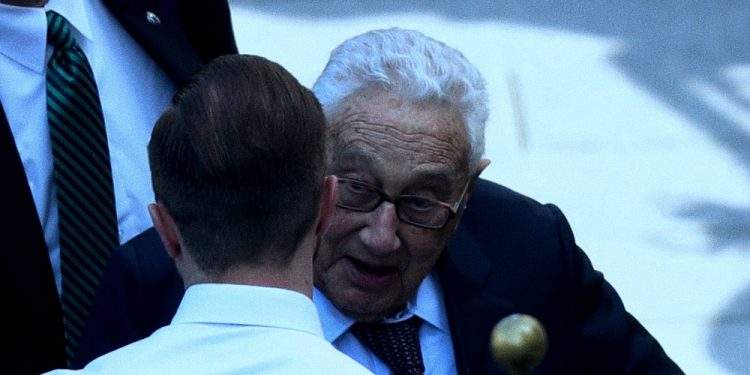The geopolitical pivot of Russia and China away from the West was the main focus of this year’s meeting of the Bilderberg Group, which ended June 5. But perhaps more riveting was the fact that it discussed a potential financial meltdown – specifically, how to ensure the continuity of the government amid economic upheavals.
The Bilderberg Group, a secretive organization established in 1954, was created to foster dialogue between Europe and North America. Every few years, around 120 to 140 political leaders and experts from industry, finance, labor, academia and media are invited to take part in the meeting, two-thirds of which come from Europe. Of these numbers, about a quarter come from politics and government, while the rest come from other fields.
Typically, the group meets in Chantilly, Virginia, just outside of Washington, D.C., but they kept the actual location secret this year. However, in its public list of attendees, this year’s meeting included the likes of Pfizer CEO Albert Bourla, former Google CEO Eric Schmidt, Senator Kyrsten Sinema of Arizona and CIA Director William J. Burns.
Global banking and financial industries were also represented at the meeting, while former Secretary of State Henry Kissinger, who courted controversy by suggesting Ukraine should cede territory to end its war with Russia, was also in attendance. (Related: Peoples’ Court to prosecute WEF-controlled globalists who used the pandemic to commit crimes against humanity.)
Ukraine was also listed as the last topic of discussion at the meeting. The overall geopolitical realignment and its resulting economic repercussions were given far more importance.
In its press release, the group stated that the meeting is a forum for informal discussions about major issues. “The meetings are held under the Chatham House Rule, which states that participants are free to use the information received, but neither the identity nor the affiliation of the speaker(s) nor any other participant may be revealed,” it said.
Due to the private nature of the meeting, participants took part as individuals and not in their official capacity, so they were not bound by the conventions of their office by pre-agreed positions. There was also no detailed agenda, no proposed resolutions, no votes taken and no policy statements issued.
This year’s meeting first since pandemic
The last time the Bilderberg Group met face to face was in 2019, with the conference kicking off with optimistic topics such as “A Stable Strategic Order” and “What’s Next for Europe?”
This year, chaos and crisis dominated the agenda, with the top schedule showing “Global Realignments” and “NATO Challenges.”
The other scheduled topics were “China,” “Indo-Pacific Realignment,” “Sino-U.S. Tech Competition,” “Russia,” “Continuity of Government and the Economy,” “Disruption of the Global Financial System,” “Disinformation,” “Energy Security and Sustainability,” “Post Pandemic Health,” “Fragmentation of Democratic Societies,” “Trade and Deglobalization” and “Ukraine.”
The Washington conference is a high-level council of war, headlined by the Secretary-General of NATO Jens Stoltenberg. He’s also joined by the Ukrainian Ambassador to the U.S. Oksana Markarova and the CEO of the state-owned Ukrainian oil and gas company Naftogaz.
The summit also discussed items with experts in Russia and Ukraine, including the Assistant Secretary of Defense for International Security Affairs Celeste Wallander and ex-Deputy National Security Adviser Nadia Schadlow.
There were also video screens for those in virtual attendance, such as Ukrainian President Volodymyr Zelensky. A few days before the beginning of the meeting, Zelensky met up with a Bilderberg and U.S. intelligence representative Alex Karp, who also runs the infamous CIA-funded surveillance and data analysis company, Palantir. (Related: How two corrupt pharma companies are cashing in on monkeypox scare.)
Set up by Bilderberg insider Peter Thiel, Palantir has agreed to give “digital support” to the Ukrainian army, as per the country’s deputy prime minister.
While Bilderberg is sometimes dismissed as a talking shop for conspiracy theorists, it is actually a major diplomatic summit that has been attended by extremely senior transatlantic politicians, such as the U.S. secretary of commerce and the president of the European council.
Follow BigGovernment.news for more news related to governments and international affairs.
Watch the video below for a brief history of the Bilderberg Meetings.
This video is from the InfoWars channel on Brighteon.com.
More related stories:
- After blazing the trail, alternative media now under censorship (Fight for alternative media more important than ever).
- Survey shows 34 percent of Americans are excited about the prospect of microchips implanted in their brains.
- In epic speech, Italian member of Parliament demands arrest of Bill Gates as a “vaccine criminal” for pursuing crimes against humanity.
- EcoHealth’s Peter Daszak deletes tweet revealing Wuhan lab researchers at Fauci-funded conference.
- Google employee in Switzerland tests POSITIVE for coronavirus, canceling internal conference.
Sources include:





